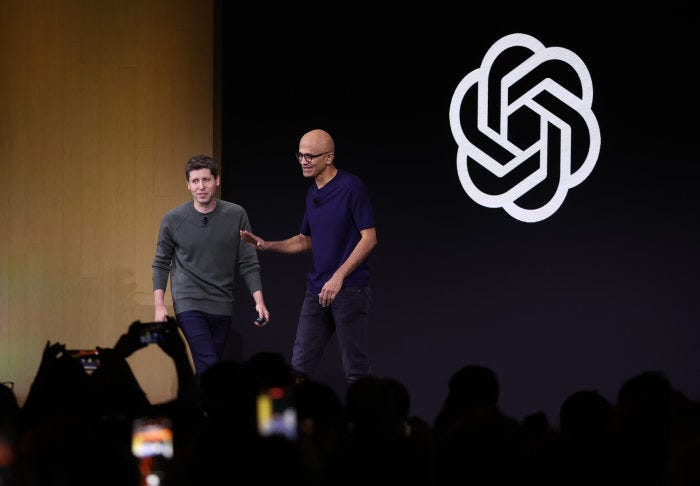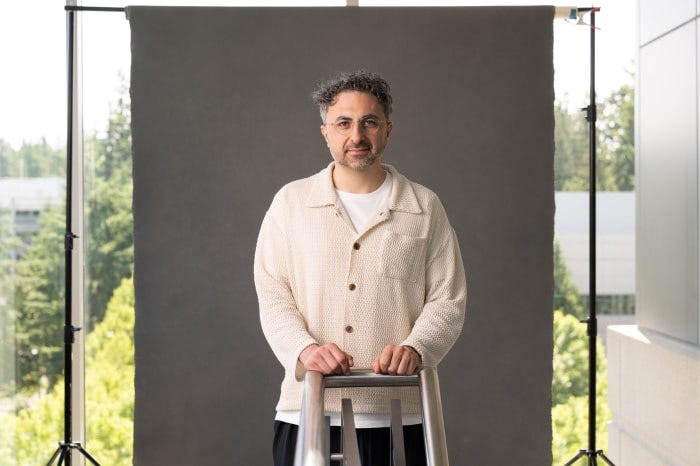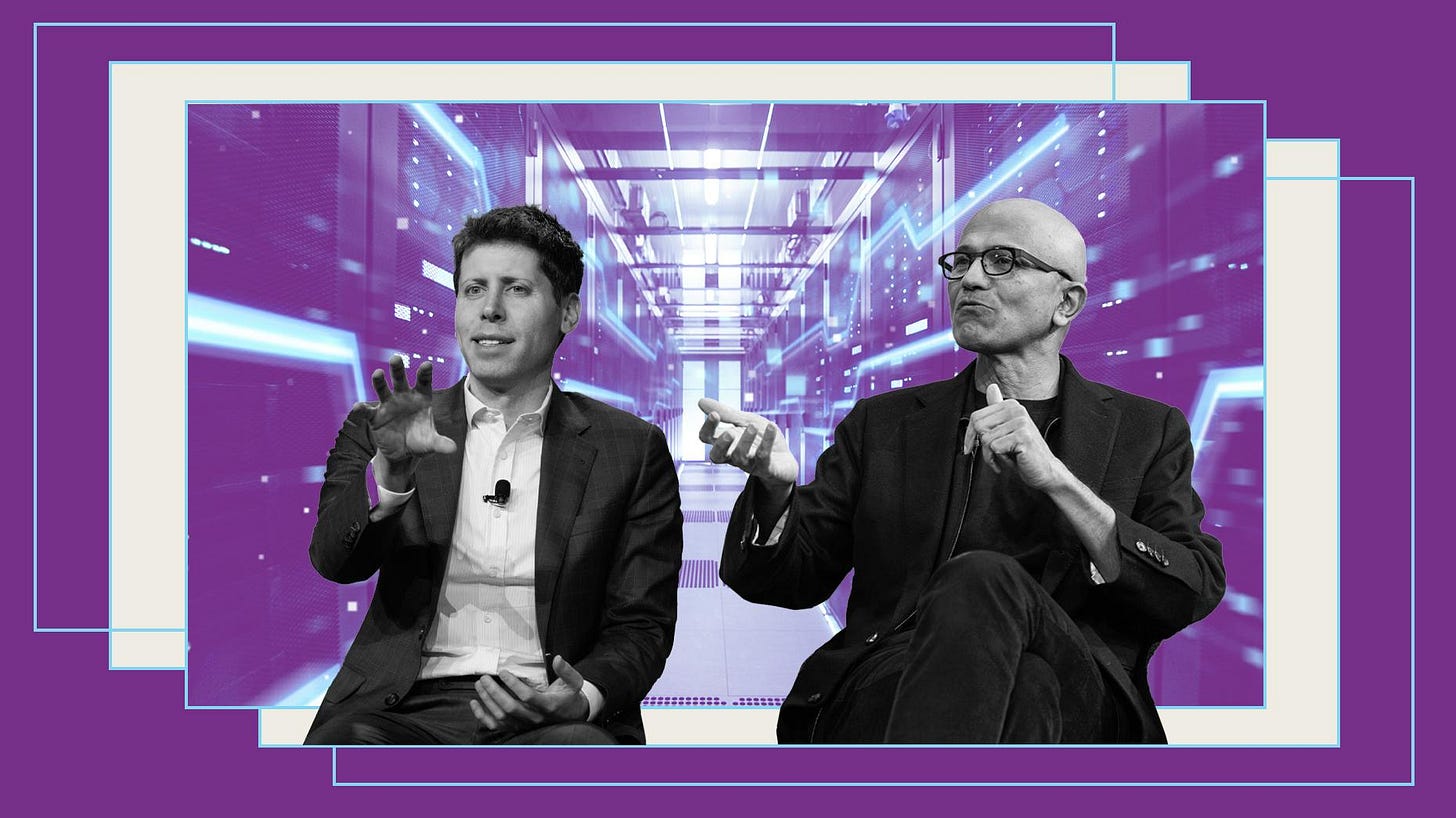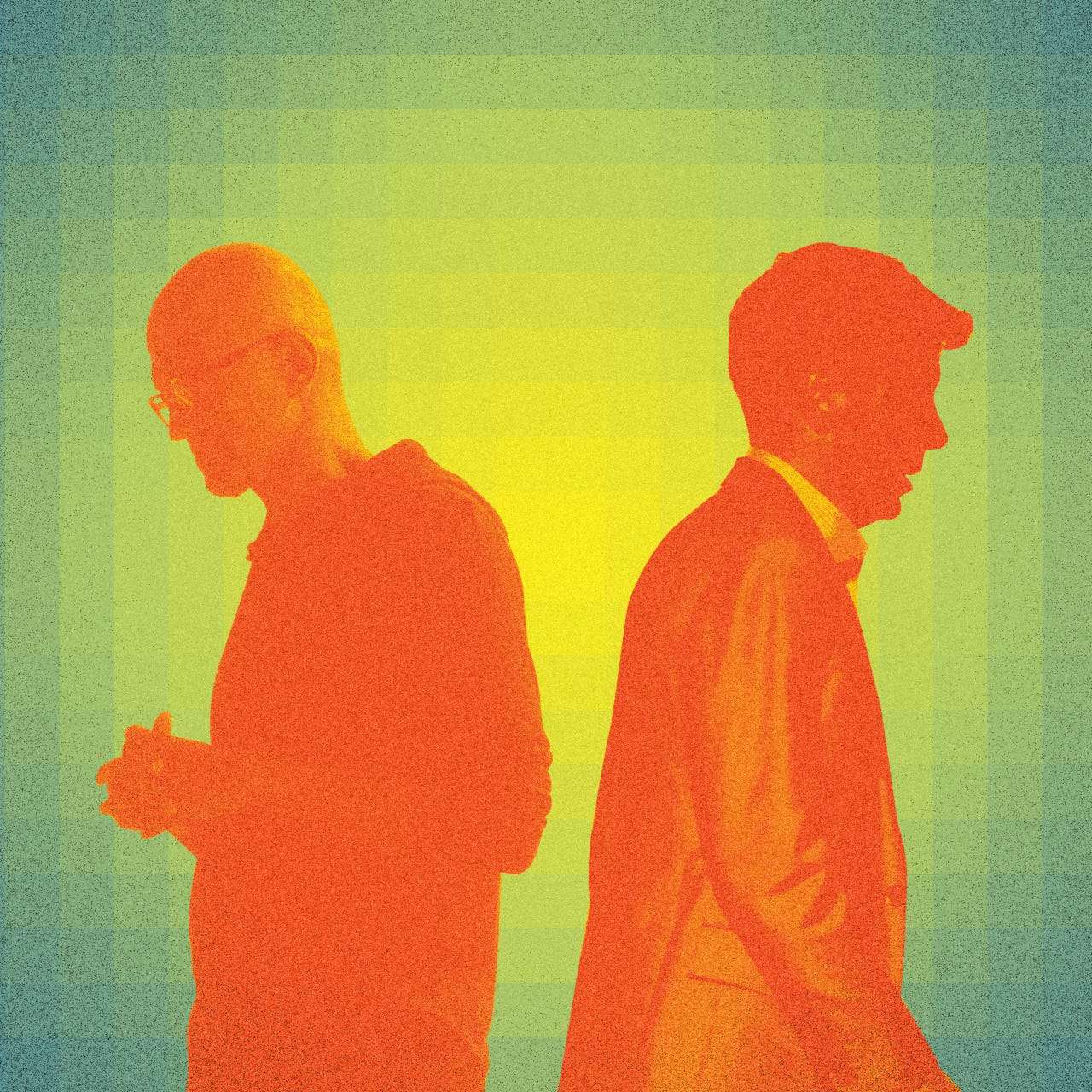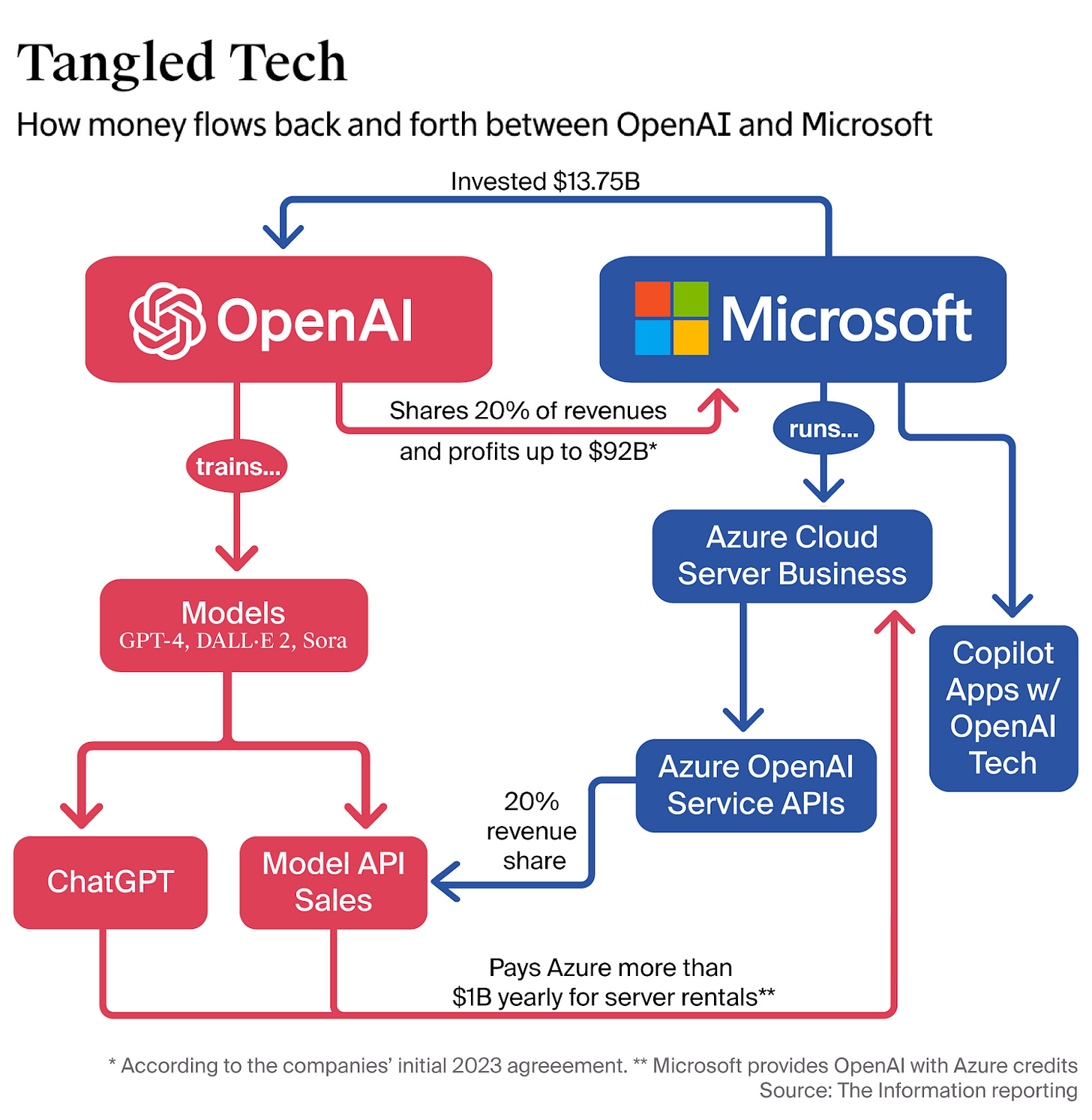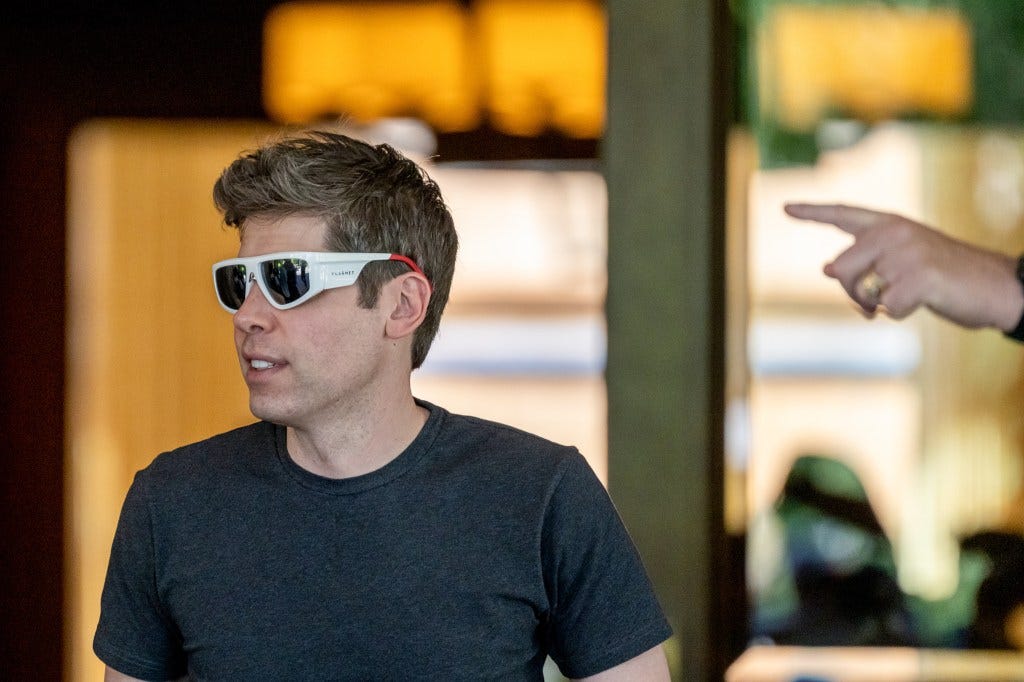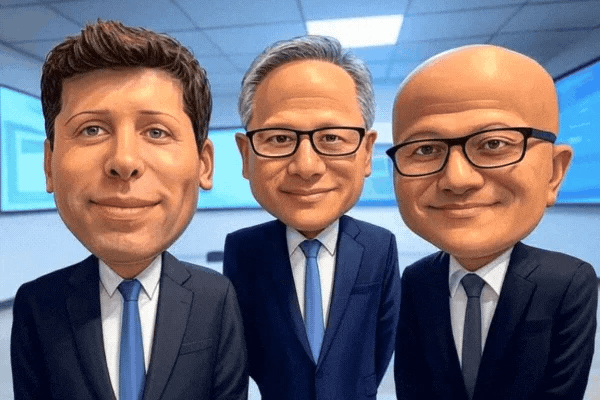
AI: Microsoft outlines its 'Post-OpenAI' path for AI. RTZ #898
The iconic Microsoft/OpenAI partnership, turbo-charged by Nvidia, is entering a new phase. The three CEOs Sam Altman, Jensen Huang, and Satya Nadella depicted above, are evolving along new paths.
Just as the ink is drying on the re-drawn OpenAI/Microsoft partnership, Microsoft is pragmatically outlining its own AI path more independent of OpenAI. This even as the CEOs of both companies appear together on podcasts underlining how both companies will continue to work closely together in this AI Tech Wave. Including the spicy bits.
Now with Microsoft’s 27% stake in the $500 billion plus AI startup, with ongoing IP rights to OpenAI’s AI tech all the way to 2032. Or AGI being announced via an independent panel, whichever comes first. Or something like that. And of course OpenAI committing to an additional $250 billion worth of Microsoft Azure services.
All paid for as OpenAI scales its current $13 billion in revenues to far higher levels to pay for that AND the $1.4 trillion in AI Data Center and Power commitments for AI Intelligence token Compute in the coming years. With or without government ‘backstops’. (That’s an AI industry kerfuffle for discussion at another time).
So even as the Microsoft/OpenAI iconic partnership morphs to its next iterations, Microsoft is fast outlining its AI strategy above and beyond OpenAI. Via its AI leader Mustafa Suleyman who came to the company via an AI acquisition not so long ago.
The WSJ lays it all out in “Microsoft Lays Out Ambitious AI Vision, Free From OpenAI”:
“Tech giant forms team led by AI chief Mustafa Suleyman to build top artificial-intelligence systems and distance itself from longtime partner.”
“Microsoft AI’s CEO outlined a new vision for AI, focusing on superintelligence and developing models with abilities that exceed those of humans.”
“Microsoft formed an “MAI Superintelligence Team,” reorganizing its team and giving priority to human interests and guardrails.”
The new goals follow a deal between Microsoft and partner OpenAI, which also compete in a number of ways.”
“Microsoft’s top artificial-intelligence executive laid out a new vision for its AI ambitions, reorganizing company employees and setting its sights on building models with superintelligence, or capabilities that exceed human performance.”
“In a blog post and interview, Microsoft AI Chief Executive Mustafa Suleyman offered a window into Microsoft’s plans to develop AI self-sufficiency from OpenAI, which is embedded into many of the products it offers to its customers.”
This as OpenAI outlines its own success independent of Microsoft on the Enterprise side, now up a fast-growing (up 40% in two months).
Microsoft is busy building ‘MAI’:
“A recent deal between the companies made it possible for Microsoft to establish its new MAI Superintelligence Team, which will put human interests and guardrails first, Suleyman said. He echoed the warnings he has made in the past about the risks the transformative technology poses to humanity.”
“While he praised OpenAI and the work the companies have done together, he offered a criticism of treating AI systems as though they have humanlike feelings or rights. AI chatbots shouldn’t trick people into thinking they are having conversations with sentient beings, he said.”
This is something I’m strongly in agreement about, having discussed a number of times the cons of anthropomorphizing AI, and marketing them in ‘humanized’ forms.
Microsoft seems to be focused on the productivity enhancing aspects of AI:
“Suleyman noted Microsoft’s focus on powerful software tools that can help people accomplish their work, improve medical diagnoses and play a role in scientific breakthroughs that will offer the world plentiful clean, renewable energy.”
“AI “is going to become more humanlike, but it won’t have the property of experiencing suffering or pain itself, and therefore we shouldn’t over-empathize with it,” Suleyman said in an interview. “We want to create types of systems that are aligned to human values by default. That means they are not designed to exceed and escape human control.”
Suleyman goes onto to highlight the negatives of encouraging emotional connections with AI:
“People have formed deep connections with many AI chatbots that in some cases preceded dangerous delusions, hospitalizations and death. The Wall Street Journal has reported on several cases involving ChatGPT, including that of a 56-year-old tech-industry veteran who was repeatedly reassured by ChatGPT about his sanity before he killed his mother and himself.”
OpenAI as well is figuring out its course along this thin line:
“OpenAI has said it added safeguards such as rerouting sensitive conversations to safer models, and it recently rolled out parental controls.”
The two companies are of course going to be competing as much as cooperating, despite their close ongoing connections:
“Though still close partners, Microsoft and OpenAI now compete in a number of ways. OpenAI is building its own data centers and striking partnerships with Microsoft rivals Amazon.com and Oracle. OpenAI also has an enterprise product that now accounts for roughly 40% of revenue, up from 30% at the beginning of the year, Chief Financial Officer Sarah Friar told the Journal Wednesday.”
“Microsoft’s Copilot chatbot relies heavily on OpenAI, but Microsoft is building, testing and releasing its own voice, image and text models. Microsoft’s updated contract with OpenAI, which was announced last week and will give Microsoft a 27% stake in the startup’s new public-benefit corporation, allows the tech giant to pursue artificial general intelligence, or AI as capable as humans, on its own.”
“Microsoft has access to OpenAI’s models until 2032, a schedule Suleyman said gives his team time to make its models into leading technology.”
This Microsoft AI initiative has been months in the making, similar to the ongoing efforts at companies like Meta. Despite the complicated ongoing relationship with OpenAI:
“Microsoft hired Suleyman, 41 years old, in 2024 and created a new AI division. He moved a group of current Microsoft AI employees into the new superintelligence team. Some of the new team members include those Microsoft AI hired from Google’s DeepMind lab, which Suleyman co-founded.”
“Meta Platforms, OpenAI and others have created superintelligence teams. Suleyman has distanced himself from OpenAI and competitors in certain ways, such as by declining to develop AI that simulates erotica.”
“Microsoft’s Copilot brand exists for enterprise tools such as its 365 productivity software, as well as its consumer-facing Copilot chatbot, although OpenAI far outpaces the consumer Copilot app in downloads. At Microsoft, some employees say replacing OpenAI technology could take years, the Journal has reported.”
It’s useful to get clarity on Microsoft’s AI path alongside and independent of OpenAI in this AI Tech Wave.
All the Mag 7/MANGO companies are rapidly evolving their paths, ‘AGI or Bust’, in a full-on ‘Frenemies’ mode in most cases. Expect more of the same, just accelerated. Stay tuned.
(NOTE: The discussions here are for information purposes only, and not meant as investment advice at any time. Thanks for joining us here)

